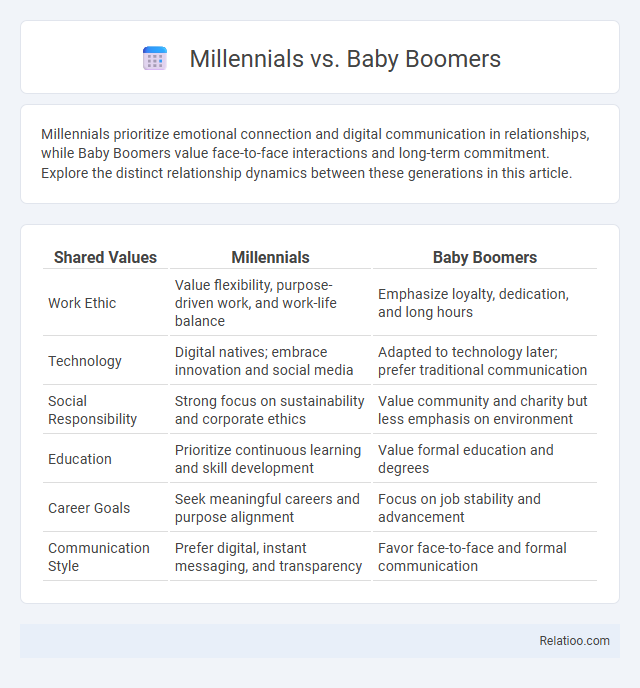Millennials prioritize emotional connection and digital communication in relationships, while Baby Boomers value face-to-face interactions and long-term commitment. Explore the distinct relationship dynamics between these generations in this article.
Table of Comparison
| Shared Values | Millennials | Baby Boomers |
|---|---|---|
| Work Ethic | Value flexibility, purpose-driven work, and work-life balance | Emphasize loyalty, dedication, and long hours |
| Technology | Digital natives; embrace innovation and social media | Adapted to technology later; prefer traditional communication |
| Social Responsibility | Strong focus on sustainability and corporate ethics | Value community and charity but less emphasis on environment |
| Education | Prioritize continuous learning and skill development | Value formal education and degrees |
| Career Goals | Seek meaningful careers and purpose alignment | Focus on job stability and advancement |
| Communication Style | Prefer digital, instant messaging, and transparency | Favor face-to-face and formal communication |
Defining Millennials and Baby Boomers
Millennials, born between 1981 and 1996, are characterized by their adaptability to digital technology, valuing experiences over material possessions, and prioritizing work-life balance. Baby Boomers, born between 1946 and 1964, are defined by their strong work ethic, loyalty to employers, and preference for face-to-face communication. Understanding these generational traits is essential for addressing workplace dynamics, consumer behavior, and social trends.
Key Historical Events Shaping Each Generation
Millennials experienced the rise of the internet, 9/11 attacks, and the Great Recession, shaping their tech-savvy and cautious financial behaviors. Baby Boomers were influenced by post-World War II prosperity, the civil rights movement, and the Vietnam War, driving their values around stability and social change. Your understanding of generational differences deepens by recognizing how these pivotal events molded distinct worldviews and priorities.
Differences in Work Ethic and Career Expectations
Millennials prioritize work-life balance and seek meaningful career experiences, emphasizing flexibility and remote work options, contrasting with Baby Boomers who value loyalty, job stability, and hierarchical advancement within traditional office settings. Generational differences in work ethic reveal Millennials' preference for collaboration and continuous feedback, whereas Baby Boomers often stress discipline, face-to-face communication, and long-term commitment to a single employer. These divergent career expectations shape workplace dynamics, influencing management styles, organizational culture, and retention strategies across industries.
Attitudes Toward Technology and Innovation
Millennials exhibit a strong preference for digital technology and innovation, embracing rapid advancements such as AI, social media, and mobile apps more readily than Baby Boomers, who often prefer traditional methods and exhibit cautious adoption. Baby Boomers tend to value technological reliability and privacy, while Millennials prioritize convenience and connectivity, driving demand for cutting-edge solutions. Generational attitudes toward technology influence workplace dynamics, consumer behavior, and the pace of innovation adoption across industries.
Financial Priorities and Spending Habits
Millennials prioritize experiences and technology-driven purchases, often investing in education and sustainable products, while Baby Boomers focus on saving for retirement and healthcare expenses. Generational spending habits reflect differing financial goals, with Millennials more inclined toward flexible, lifestyle-oriented spending and Baby Boomers emphasizing stability and long-term wealth accumulation. Understanding these generational financial priorities helps you tailor budgeting and investment strategies to your specific life stage and economic outlook.
Views on Marriage, Family, and Relationships
Millennials tend to prioritize emotional fulfillment and personal growth in marriage and relationships, often delaying marriage compared to Baby Boomers who value long-term commitment and traditional family structures. Baby Boomers typically emphasize stability and lifelong partnership, while Millennials show greater openness to cohabitation and diverse family forms. Generational shifts illustrate evolving attitudes towards relationships, with Millennials embracing flexible roles and redefining family beyond conventional norms.
Political Perspectives Across Generations
Millennials tend to prioritize progressive policies such as climate change action, social justice, and economic equity, while Baby Boomers often emphasize traditional values, economic stability, and national security. Generational differences in political perspectives are influenced by formative experiences, with Millennials shaped by the Great Recession and digital connectivity, whereas Baby Boomers were influenced by post-war prosperity and Cold War dynamics. These contrasting viewpoints drive divergent voting patterns and policy preferences across key issues like healthcare, immigration, and environmental regulations.
Approach to Health and Wellness
Millennials prioritize mental health, holistic wellness, and fitness technology integration, often engaging in mindfulness practices and personalized health apps. Baby Boomers emphasize preventive care, managing chronic conditions, and maintaining physical activity through traditional methods such as walking or swimming. Generational differences in health and wellness reflect technological adoption, healthcare access, and lifestyle preferences, shaping unique approaches to nutrition, exercise, and medical care.
Environmental Awareness and Activism
Millennials demonstrate heightened environmental awareness and engage more actively in climate activism compared to Baby Boomers, who tend to prioritize economic growth over ecological concerns. Your commitment to sustainability aligns with Millennials' preference for renewable energy and eco-friendly products, contrasting with Baby Boomers' more traditional consumption patterns. Generational shifts reveal increasing support for policies addressing climate change, driven by Millennials' and Gen Z's advocacy for systemic environmental reform.
The Future: Bridging the Generational Gap
Bridging the generational gap between Millennials and Baby Boomers requires fostering mutual understanding of evolving values and communication styles to create a cohesive future workforce. Emphasizing shared goals and leveraging each generation's unique strengths will enhance collaboration and innovation. You can facilitate this by encouraging open dialogue and promoting inclusive leadership across all age groups.

Infographic: Millennials vs Baby Boomers
 relatioo.com
relatioo.com